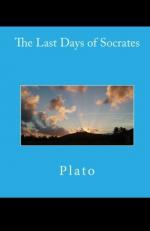|
This section contains 640 words (approx. 2 pages at 400 words per page) |

|
The Last Days of Socrates Summary & Study Guide Description
The Last Days of Socrates Summary & Study Guide includes comprehensive information and analysis to help you understand the book. This study guide contains the following sections:
This detailed literature summary also contains Topics for Discussion and a Free Quiz on The Last Days of Socrates by Plato.
This a work devoted to one of the ancient world's most famous philosophers. Included in the book are four books, known as dialogs. These take place during the year that turned out to be Socrates' last. They have been assembled as a group of four. These are individually entitled: Euthyphro, the Apology, Crito, and the Phaedo. Readers interested in discovering the plot as they proceed should avoid reading the introductions until the end, as "all is revealed" in them.
Socrates lived and worked in Athens. A philosopher, he was usually employed in some other capacity and was not one of the wealthier people in town. He is known to have had a wife and children. One of the jobs he held was that of city guard. Sadly, his reputation as a husband, even two millenia later is not good.
His reputation in Athens was nurtured strongly by one of his powerful social connections: that of the local oligarch, Plato. Plato often had parties at which philosophical discussions flowed as freely as the wine and Socrates became a well favored guest. However, once he had a strong reputation, Socrates began to chafe at the body politic of the city-state of Athens. Over time, local politicians perceived him as a growing danger, until threats against his life began to develop.
Eventually, Athens delivered Socrates a final ultimatum: either get out of Athens forever or die in Athens soon. Socrates, given the choice, decided to let himself be killed off by the local government as preferable to living anywhere else. He claimed, upon acceptance of the punishment, that he really loved the city-state of Athens and her people. The year that he was taken as a political prisoner and tried was 399 BC. He lost his case and was sentenced. This resulted in his premature death by the imbibement of poison hemlock.
A few years after his death, Plato, one of his most beloved student admirers, began to write about him. Plato is famous is in his own right as both a philosopher and as a professional instructor. He was mentored by Socrates and in turn mentored Aristotle, even though the latter became somewhat of an opponent. Aristotle learned a tremendous amount from Plato but once fully matured he developed and taught his own ideas rather than spending his entire adulthood under Plato, or strictly furthering Plato's thought. Plato is also famed for having preserved the legacy of Socratic methodology.
What follows are the four dialogs set prior to the death of Socrates. The philosophical matters that relate directly to the lengthy conversations are covered. Those that pertain to the trial and reputation and sentencing of Socrates are distinguished from those that go beyond those matters.
There is an extensive reading list, filed under Plato rather than under Socrates. Tarrant tells readers that the eldest known document accurately recounting what Plato originally wrote comes from the 9th century, well over one thousand years after the work was originally drafted.
There is one additional point that needs to be addressed—the nature of the translations. The English translators wrote from a monotheistic bias. The work used is from the 900s AD/CE. Due to this, word choice may not best reflect what was intended, especially their choice of the word "God." However, the Delphic oracle was a Temple of Apollo, and the intimate connection between light, the Sun and benevolence can be interpreted so as to view Apollo as a naive precursor to the "One True God," thus later writers translated Socrates' references to "the god" or "gods" as "God." There are some instances in this summary in which God has been used, in reference to Apollo, by the editors for this reason. It is important to an understanding of Socrates to determine whether or not this usage is just.
Read more from the Study Guide
|
This section contains 640 words (approx. 2 pages at 400 words per page) |

|



